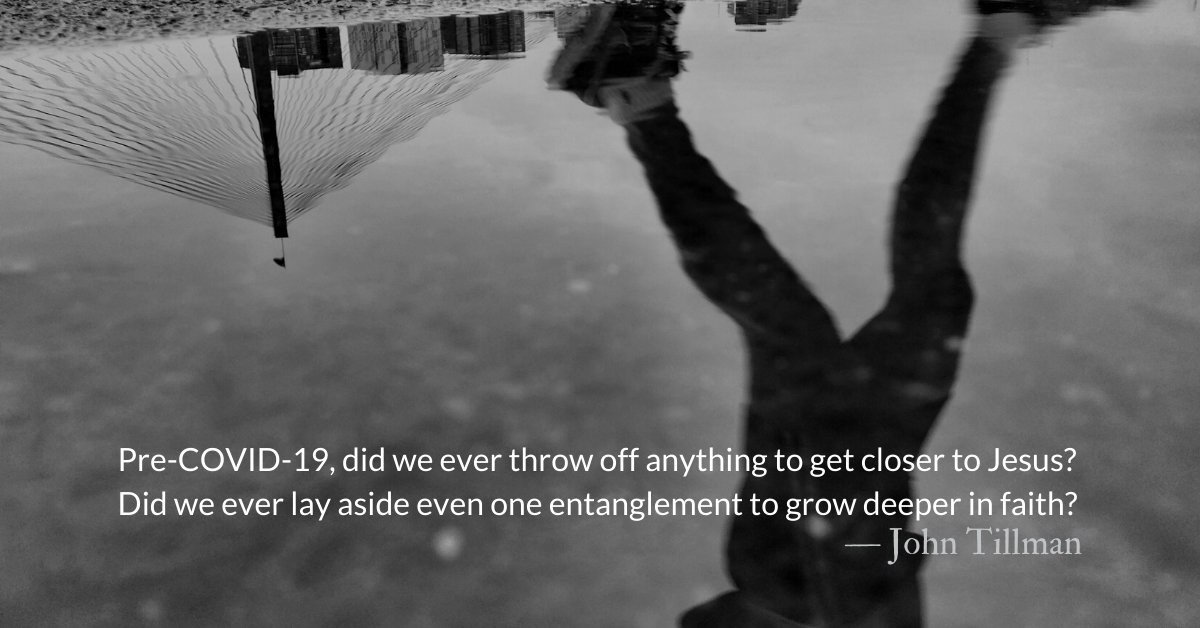Scripture Focus: Ecclesiastes 7.2-4
It is better to go to a house of mourning
than to go to a house of feasting,
for death is the destiny of everyone;
the living should take this to heart.
Frustration is better than laughter,
because a sad face is good for the heart.
The heart of the wise is in the house of mourning,
but the heart of fools is in the house of pleasure.
Proverbs 4.7
Get wisdom. Though it cost all you have, get understanding.
Hebrews 12.1-2
…let us throw off everything that hinders and the sin that so easily entangles. And let us run with perseverance the race marked out for us, fixing our eyes on Jesus…
Reflection: Wisdom in Houses of Mourning
By John Tillman
What happens when a society addicted to activity, distraction, and consumption has every activity canceled, normal distractions displaced, and consumption disrupted? We mourn.
Solomon tells us that there is more wisdom to be gained in a house of mourning than one of celebrating. In some ways, the homes in which we are sheltering have become houses of mourning. We are certainly mourning the frenetic fantasy of fruitfulness that our former schedules gave us. Our economies, both global and personal, were accelerated and everything else was trimmed out so that we could push harder for greater gain. But were we really gaining in the ways that are important? Did we trim out the wrong things? What can we learn from this unexpected experience of mourning?
Paul writes that we should throw off everything that hinders us and the sin that so easily entangles us to run after Jesus, fixing our eyes on him. But in our previous life, pre-COVID-19, did we ever throw off anything to get closer to Jesus? Did we ever lay aside even one entanglement to grow deeper in faith? Did we fix our eyes more intently on Jesus than on our devices, work tasks, and investment portfolios? Did we strip even one thing out of our lives because it interfered with reading the Bible? Did we cancel even one activity in order to make more time to pray?
For the majority of us, the answers to these questions are probably “no.” Many of us may need to confess that what we tossed aside was Jesus, and the entanglement we escaped was the cords of loving-kindness that God sought to guide us by. We limited Jesus, the Bible, and prayer, to “when we have time” as if time was the issue and not our heart.
What if we learned from what we have lost how valuable what we still have is?
What if we, relieved of the burden of physically running from activity to activity, learned to run after Jesus spiritually?
What if we learned to make time with the most important things the most important time in our day?
I think personally we would be blown away by the tangible presence and power of God in our lives.
I think it would be a revelation.
And I think culturally the world would be blown away by the shockingly beautiful things God would call the church to do in the world.
I think it would be a revolution.
Divine Hours Prayer: The Refrain for the Morning Lessons
Those who sowed with tears will reap with songs of joy.
Those who go out weeping, carrying the seed, will come again with joy, shouldering their sheaves. — Psalm 126.6-7
– Divine Hours prayers from The Divine Hours: Prayers for Springtime by Phyllis Tickle.
Today’s Readings
Ecclesiastes 7 (Listen – 3:37)
2 Timothy 3 (Listen -2:21)
Read more about Prayer Amidst Evil :: Guided Prayer
The inevitable next tragedy will come. Whether it is the result of unthinking violence, tragic accident, or premeditated and targeted hatred, we turn to God in prayer…
Read more about Fasting from the Feast
Our culture has steadily, for decades, been encouraging us to abstain from spiritual disciplines in favor of activities that we are led to believe are more profitable.






